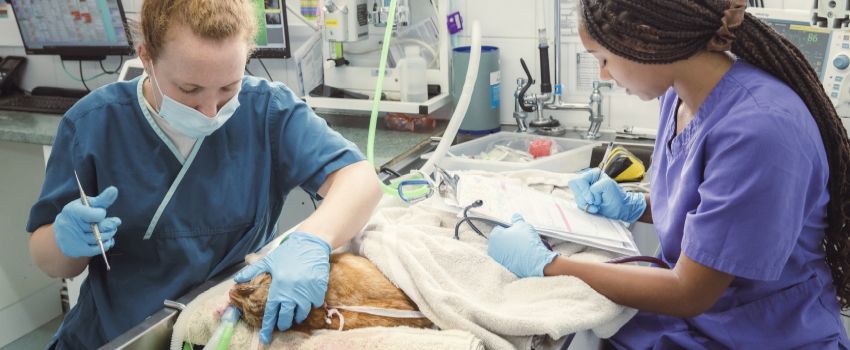Who's who in your veterinary practice
Your pet’s welfare is important to you, so it's essential to understand who will be responsible for their care when they're sick or require preventive treatment. Our guide will introduce you to the professionals at your veterinary practice who will look after your pet.

On this page:
- Veterinary surgeon
- Other vets and referrals
- Registered veterinary nurse
- Student veterinary surgeon
- Student veterinary nurse
- Non-clinical staff
Veterinary surgeon
The person you are most likely to see at your veterinary practice is the veterinary surgeon, or 'vet' for short.
Vets have completed a veterinary degree course lasting five or six years and may have taken additional qualifications to increase their skills and knowledge. They are qualified to diagnose and treat animal illnesses and injuries, perform surgeries, give vaccinations, provide preventative care, and offer advice on animal health and behaviour.
The title 'veterinary surgeon' is protected by law, which means only vets who are registered with the RCVS can use it in the UK. Activities defined as 'veterinary surgery', including diagnosis, treatment and surgical procedures, can only be performed by a veterinary surgeon who is on the RCVS register by law, with some exceptions.
Vets must follow the RCVS Code of Professional Conduct and keep their skills and knowledge up to date through continuing professional development.
To check whether a vet is registered with us, use our Find a Vet service.
Other vets and referrals
Sometimes, your pet may require care for a specific concern, and your vet might suggest referring them to another vet who has expertise in this area. It’s normal to feel concerned when you hear the word "referral", but there are many reasons why this might be appropriate, and it doesn't necessarily indicate a serious issue.
Specialists
The title of RCVS Specialist represents the highest standard in clinical veterinary practice. Vets can only call themselves specialists if they have been accepted on the RCVS Specialist list.
To be recognised as an RCVS Specialist, a vet must:
• hold a postgraduate diploma or equivalent qualification;
• demonstrate to the RCVS that they actively contribute to their speciality;
• have recognition both nationally and internationally; and
• publish widely in their area of expertise.
An RCVS Specialist must reapply to the RCVS for recognition every five years to maintain their specialist status.
Use our Find a Vet service to discover which practices have specialists on their teams.
Advanced Practitioners
Between your regular vet and the specialist is a middle tier: the Advanced Practitioner.
An Advanced Practitioner is an experienced vet who has developed their expertise through additional education following their initial training. They have also obtained qualifications in a specific field, such as small animal medicine or diagnostic imaging. While they are not specialists, they have shown that they possess current knowledge and skills in their area of focus.
To find an Advanced Practitioner near you, use our Find a Vet service and choose the 'advanced search' option.
Is seeing a specialist expensive?
Due to their extensive training and expertise, it can be more expensive to see a specialist or Advanced Practitioner than your usual vet. However, getting a prompt and accurate diagnosis of your pet's health problem may save you money in the long run.
For more information on paying for veterinary care, see Fees and Pricing.
Registered veterinary nurse
Registered veterinary nurses (RVNs) support the vet in caring for your pet and offering you guidance.
RVNs are equipped to provide a high standard of nursing care, based on a solid understanding of your pet’s condition and individual needs. They can also provide advice on preventative health measures for your pet, such as dental care and nutrition, and support the management of ongoing conditions such as diabetes.
Only individuals who have completed an approved programme of study, which lasts two to four years depending on their selected path, and passed the necessary assessments can apply to register with us and use the letters RVN after their name.
RVNs must adhere to the RCVS Code of Professional Conduct. They are also required to keep up to date with their skills and knowledge through continued professional development.
If you wish to confirm that a veterinary nurse is registered with us, you can use our Find a Vet service and select the 'nurse' option.
Student veterinary surgeon
When you take your pet to the vet, a student veterinary surgeon might be present in the consulting room.
In the UK, student vets must complete 20 weeks of clinical placements as part of their degree. This hands-on experience is essential for enhancing their academic learning with practical skills.
Student vets are allowed to do many of the things registered veterinary surgeons can do, as long as they are under appropriate direction and/or supervision from a registered vet.
Student veterinary nurse
You might notice student vet nurses at your practice. These students may work part-time while studying to become a veterinary nurse at a local college. Alternatively, they might be carrying out a clinical placement as part of their veterinary nursing degree.
Student vet nurses can perform many of the same procedures as registered veterinary nurses, provided they are undertaking them as part of their studies. They must be closely and continuously monitored by a registered veterinary nurse or, if they are performing minor surgery, a veterinary surgeon. For other treatments, they can work under general supervision. The supervising veterinary surgeon will assess their abilities before giving them any responsibilities.
Non-clinical staff
Most practices will employ a range of non-clinical staff, including professional practice managers, receptionists, veterinary nursing assistants and kennel staff.
If you are in any doubt as to who is speaking to you about your pet, always ask.